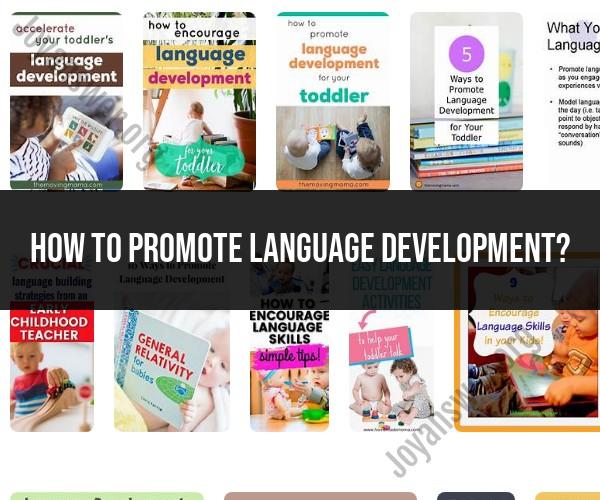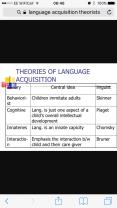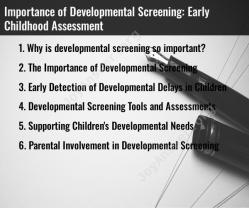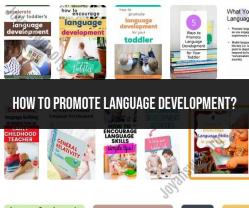How to promote language development?
Promoting language development in children, whether it's your own child or one you work with as an educator or caregiver, is crucial for their overall cognitive and social development. Here are some effective tips and strategies:
Talk to Them:
- Engage in conversations with children from a very young age. Talk about everyday activities, objects, and experiences. This helps them build their vocabulary and grasp the structure of language.
Active Listening:
- Encourage active listening by giving your full attention when they speak. Respond to their questions and comments to show that their words are valued.
Read Aloud:
- Read to children regularly, even from infancy. Choose age-appropriate books with colorful pictures and simple text. Reading aloud helps develop their language skills and fosters a love of reading.
Use Rich and Varied Vocabulary:
- Expand their vocabulary by introducing new words regularly. Describe objects, actions, and feelings using descriptive language. Avoid using only baby talk.
Narrate Daily Activities:
- Describe what you are doing throughout the day. For example, while cooking, explain the steps involved. This helps children learn new words and understand the sequence of events.
Ask Open-Ended Questions:
- Instead of asking yes/no questions, ask open-ended questions that require more than a one-word answer. Encourage them to express themselves and share their thoughts.
Encourage Storytelling:
- Encourage children to make up stories or recount their own experiences. This boosts their creativity and language skills.
Play with Language:
- Engage in word games, rhyming, and singing songs that involve repetitive or rhythmic patterns. This helps with phonemic awareness and language structure.
Use Technology Mindfully:
- While some educational apps and programs can be useful, limit screen time and prioritize face-to-face interactions and hands-on activities.
Provide a Print-Rich Environment:
- Surround children with books, magazines, and written materials. Having access to written language encourages curiosity and exploration.
Engage in Pretend Play:
- Role-playing and pretend play scenarios allow children to experiment with language and social interactions. Encourage them to play as different characters and use their imaginations.
Visit Libraries and Museums:
- Take children to libraries and museums where they can explore books and interactive exhibits related to language, culture, and history.
Peer Interaction:
- Arrange playdates or group activities with peers. Interacting with other children helps them practice communication skills and learn from their peers.
Be Patient and Encouraging:
- Understand that language development varies from child to child. Be patient, provide positive reinforcement, and avoid criticism.
Seek Professional Help If Needed:
- If you have concerns about a child's language development, consult with a pediatrician or speech therapist for guidance and evaluation.
Cultural Sensitivity:
- Be aware of cultural differences in language and communication styles. Respect and value the child's cultural background in language development.
Remember that language development is a gradual process, and children learn at their own pace. Creating a nurturing and language-rich environment is essential for helping them develop strong communication skills that will serve them well throughout their lives.
Promoting Language Development in Children: Strategies and Tips
This book provides a comprehensive overview of language development in children, from birth to adolescence. It covers the different stages of language development, the factors that influence language development, and strategies for promoting language development in children.
The Role of Reading in Enhancing Language Skills in Kids
This book focuses on the importance of reading for language development. It discusses the benefits of reading to children, how to choose books for different ages, and activities to promote reading comprehension and vocabulary development.
Speech Therapy and Language Development Support for Children
This book provides information about speech therapy and language development support for children. It covers the different types of speech therapy, how to find a speech therapist, and what to expect from speech therapy sessions.
Which book is best for you?
If you're looking for a general overview of language development in children and strategies for promoting language development, I recommend
Promoting Language Development in Children: Strategies and Tips
. If you're interested in the role of reading in language development,The Role of Reading in Enhancing Language Skills in Kids
is a good option. And if you're looking for information about speech therapy and language development support for children,Speech Therapy and Language Development Support for Children
is a good choice.No matter which book you choose, I encourage you to read it carefully and apply the information to your own life. Language development is an essential part of child development, and there are many things that parents and caregivers can do to promote language development in children.
Additional tips for promoting language development in children:
- Talk to your child often and about everything.
- Respond to your child's babbling and gestures.
- Read to your child every day.
- Sing songs and play games with your child.
- Provide your child with opportunities to interact with other children.
- If you're concerned about your child's language development, talk to your pediatrician or a speech therapist.







